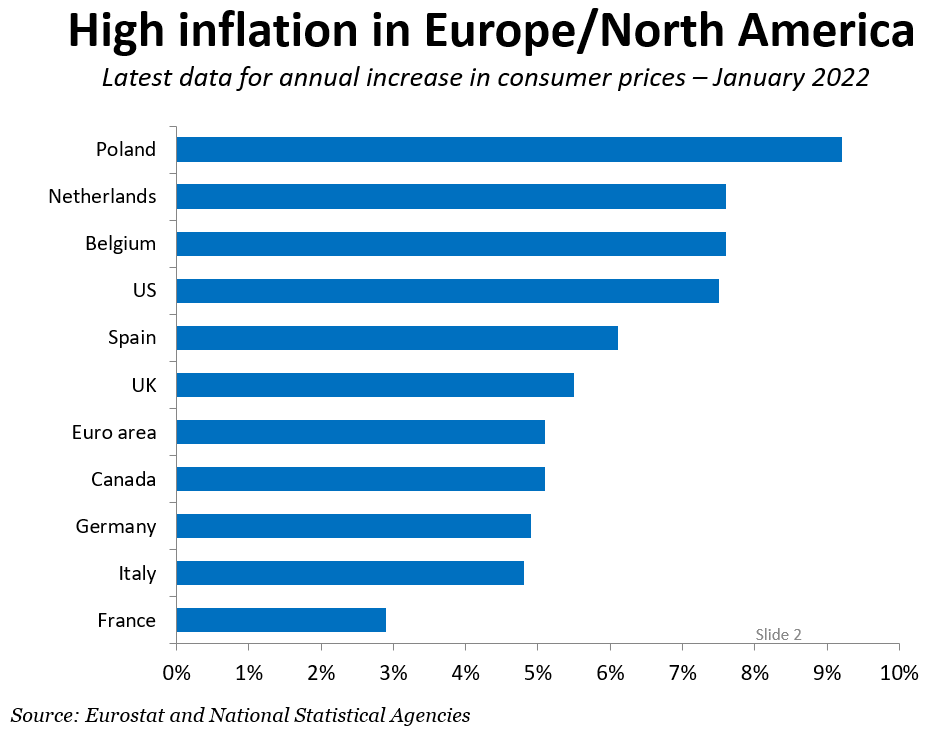Inflation – how worried should we be?

Andrew Sentance, Senior Adviser to Cambridge Econometrics and former member of the Monetary Policy Committee for the Bank of England, argues that in terms of both monetary and fiscal policy, policy-makers around the world need to take a gradualist approach to countering the current inflation surge.
Inflation is on the rise in the UK and in many other countries around the world. Consumer Price Inflation has hit 5.5 percent in the UK, 5.1 percent in the euro area and 7.5 percent in the U.S. The Bank of England’s latest Monetary Policy Report indicates that UK CPI inflation will also reach over 7 percent in the spring.
The recent surge in energy prices since the Russian invasion of Ukraine is likely to push up inflation rates even higher.

The scale of this inflation surge has taken policy-makers by surprise. Where is this rise in inflation coming from, and how long might it last? It is driven by a mixture of global and domestic factors –some short-term but others threatening to be more persistent.
At the global level, the strength of the rise in demand – as lockdowns and other pandemic restrictions were eased – has put upward pressure on energy prices, other commodity prices and strained global supply chains. Around the world, this is causing factory gate prices to rise rapidly – in many countries at double digit levels. The U.S. Producer Price Index was 9.7 percent up on a year ago in January this year.
These upward pressures on prices and costs from global markets will not subside quickly. The world economy is expected to grow strongly both this year and next so global demand pressures are likely to continue to exert an upward influence on inflation for some time. Meanwhile, the supply side of many economies is struggling to keep up with the bounce-back in economic activity we have seen since the first half of last year.
Tightness of labor markets
A major constraint on the supply side of the economy is the tightness of labor markets in many economies. Unemployment rates are at or close to historic lows in the U.S. (4.0 percent), UK (4.1%) and Germany (3.2%) for example. The lack of availability of labor is adding to wage pressures as skill shortages emerge in many industries. In the UK, for example, there are now nearly 1.3 million unfilled vacancies – compared to around 700-800,000 before the pandemic. The withdrawal of many workers from the labor force – sometimes described as “The Great Resignation” – has added to this problem as the supply of labor has fallen.
Labor shortages and resulting upward wage pressure could easily prolong the inflation surge as we look ahead. With productivity growth in most advanced economies remaining sluggish, rising wages can only be accommodated by passing higher costs on to consumers in the form of higher prices.
As Paul Krugman and other economists have commented, this depends on how far inflation expectations are pushed up by the current inflation surge. The higher inflation goes and the longer the surge is sustained, the more likely it becomes that expectations of sustained price rises become more deeply embedded.
The strength of the inflation surge creates dilemmas for both monetary and fiscal policy. Central Banks have been caught unawares and now face the challenge of rapidly reversing the stimulatory policies adopted in response to the pandemic. However, Central Banks must strike a balance between the need to tighten policy in response to the threat of inflation and the risk of destabilizing the growth path of the economy.
Gradual interest rate rises and cautious approach to unwinding QE
Gradual interest rate rises and a cautious approach to unwinding QE still seem the best course of action.
Market expectations are for the UK Bank Rate to reach 1.5 percent by mid-2023 – and further interest rate rises will probably be needed as we move through the mid-2020s.In the U.S., interest rates are expected to follow a broadly similar path.
By consistently and gradually raising interest rates – and communicating this policy clearly to the public and the markets – Central Banks will be signalling that they are committed to heading off a longer and more sustained surge in inflation.
What about fiscal policy?
On the fiscal policy front, the dilemma is between the objective of moving the public sector deficit to a more sustainable position and taking steps to ease the cost of living squeeze from soaring energy prices – particularly on poorer households.
While there needs to be a long-term plan to bring government borrowing down gradually, there is no urgency about the timing of this reduction. Governments in most Western economies are still borrowing very easily on bond markets at low rates of interest.
If – as seems likely – global interest rates rise through the 2020s, it will then become more important to take more concrete steps to reduce the public deficit. Even then the objective should be to achieve a more modest level of public borrowing (e.g. 2-3 percent of GDP). There is no need to target budget surpluses or aggressive debt reduction.
Sensible controls on public spending will help with the process of deficit reduction. And on the revenue side, we need a program of long-term tax reform aimed at generating extra revenue by dealing with anomalies and distortions in the tax system.
A long-term fiscal program of deficit reduction and tax reform can safely be implemented over a number of years (e.g. 5 years or longer). More immediate short-term tax-raising measures which will aggravate cost pressures and squeeze consumers further should be avoided.
In terms of both monetary and fiscal policy, policy-makers around the world need to take a gradualist approach to countering the current inflation surge. That would be better than the alternatives of a kneejerk aggressive tightening of policy – which could trigger a recession – or neglecting the rise in inflation, and then having to take much more dramatic policy action later this decade.
Sign up to our newsletter for our latest news, opinions and collaborations from around the world.